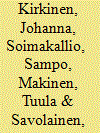| Srl | Item |
| 1 |
ID:
093501


|
|
|
|
|
| Publication |
2010.
|
| Summary/Abstract |
New raw materials for transportation fuels need to be introduced, in order to fight against climate change and also to cope with increasing risks of availability and price of oil. Peat has been recognised suitable raw material option for diesel produced by gasification and Fischer-Tropsch (FT) synthesis. The energy content of Finnish peat reserves is remarkable. In this study, the greenhouse impact of peat-based FT diesel production and utilisation in Finland was assessed from the life-cycle point of view. In 100 year's time horizon the greenhouse impact of peat-based FT diesel is likely larger than the impact of fossil diesel. The impact can somewhat be lowered by producing peat from the agricultural peatland (strong greenhouse gas emissions from the decaying peatlayer are avoided) with new peat production technique, and utilising the produced biomass from the after-treatment area for diesel also. If diesel production is integrated with pulp and paper mill to achieve energy efficiency benefits and if the electricity demand can be covered by zero emission electricity, the greenhouse impact of peat-based FT diesel reduces to the level of fossil diesel when agricultural peatland is used, and is somewhat higher when forestry-drained peatland is used as raw material source.
|
|
|
|
|
|
|
|
|
|
|
|
|
|
|
|
| 2 |
ID:
099282


|
|
|
|
|
| Publication |
2010.
|
| Summary/Abstract |
The objective of this study is to evaluate a select set of financial incentive instruments that can be employed by the Norwegian government for encouraging early investment and production experience in wood-based Fischer-Tropsch diesel (FTD) technologies as a means to accelerate reductions in greenhouse gas emissions (GHG) stemming from road-based transport. We start by performing an economic analysis of FTD produced from Norwegian forest biomass at a pioneer commercial plant in Norway, followed with a cost growth analysis to estimate production costs after uncertainty in early plant performance and capital cost estimates are considered. Results after the cost growth analysis imply that the initial production cost estimates for a pioneer producer may be underestimated by up to 30%. Using the revised estimate we then assess, through scenarios, how various financial support mechanisms designed to encourage near-term investment would affect production costs over a range of uncertain future oil prices. For all policy scenarios considered, we evaluate trade-offs between the levels of public expenditure, or subsidy, and private investor profitability. When considering the net present value of the subsidy required to incentivize commercial investment during a future of low oil prices, we find that GHG mitigation via wood-FTD is likely to be considered cost-ineffective. However, should the government expect that mean oil prices in the coming two decades will hover between $97 and 127/bbl, all the incentive policies considered would likely spur investment at net present values =$-100/tonne-fossil-CO2-equivalent avoided.
|
|
|
|
|
|
|
|
|
|
|
|
|
|
|
|